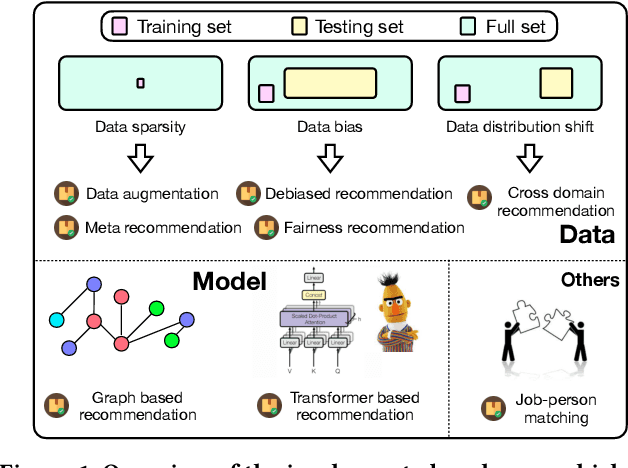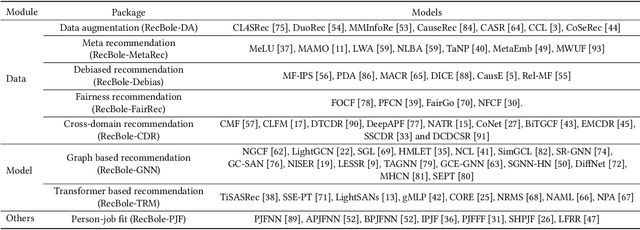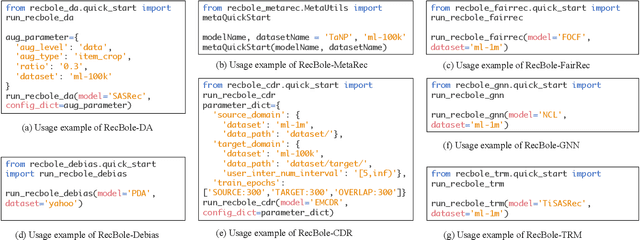Wenqi Sun
Slow Thinking for Sequential Recommendation
Apr 13, 2025Abstract:To develop effective sequential recommender systems, numerous methods have been proposed to model historical user behaviors. Despite the effectiveness, these methods share the same fast thinking paradigm. That is, for making recommendations, these methods typically encodes user historical interactions to obtain user representations and directly match these representations with candidate item representations. However, due to the limited capacity of traditional lightweight recommendation models, this one-step inference paradigm often leads to suboptimal performance. To tackle this issue, we present a novel slow thinking recommendation model, named STREAM-Rec. Our approach is capable of analyzing historical user behavior, generating a multi-step, deliberative reasoning process, and ultimately delivering personalized recommendations. In particular, we focus on two key challenges: (1) identifying the suitable reasoning patterns in recommender systems, and (2) exploring how to effectively stimulate the reasoning capabilities of traditional recommenders. To this end, we introduce a three-stage training framework. In the first stage, the model is pretrained on large-scale user behavior data to learn behavior patterns and capture long-range dependencies. In the second stage, we design an iterative inference algorithm to annotate suitable reasoning traces by progressively refining the model predictions. This annotated data is then used to fine-tune the model. Finally, in the third stage, we apply reinforcement learning to further enhance the model generalization ability. Extensive experiments validate the effectiveness of our proposed method.
Distillation is All You Need for Practically Using Different Pre-trained Recommendation Models
Jan 01, 2024Abstract:Pre-trained recommendation models (PRMs) have attracted widespread attention recently. However, their totally different model structure, huge model size and computation cost hinder their application in practical recommender systems. Hence, it is highly essential to explore how to practically utilize PRMs in real-world recommendations. In this paper, we propose a novel joint knowledge distillation from different pre-trained recommendation models named PRM-KD for recommendation, which takes full advantages of diverse PRMs as teacher models for enhancing student models efficiently. Specifically, PRM-KD jointly distills diverse informative knowledge from multiple representative PRMs such as UniSRec, Recformer, and UniM^2Rec. The knowledge from the above PRMs are then smartly integrated into the student recommendation model considering their confidence and consistency. We further verify the universality of PRM-KD with various types of student models, including sequential recommendation, feature interaction, and graph-based models. Extensive experiments on five real-world datasets demonstrate the effectiveness and efficacy of PRM-KD, which could be viewed as an economical shortcut in practically and conveniently making full use of different PRMs in online systems.
Universal Multi-modal Multi-domain Pre-trained Recommendation
Nov 03, 2023Abstract:There is a rapidly-growing research interest in modeling user preferences via pre-training multi-domain interactions for recommender systems. However, Existing pre-trained multi-domain recommendations mostly select the item texts to be bridges across domains, and simply explore the user behaviors in target domains. Hence, they ignore other informative multi-modal item contents (e.g., visual information), and also lack of thorough consideration of user behaviors from all interactive domains. To address these issues, in this paper, we propose to pre-train universal multi-modal item content presentation for multi-domain recommendation, called UniM^2Rec, which could smoothly learn the multi-modal item content presentations and the multi-modal user preferences from all domains. With the pre-trained multi-domain recommendation model, UniM^2Rec could be efficiently and effectively transferred to new target domains in practice. Extensive experiments conducted on five real-world datasets in target domains demonstrate the superiority of the proposed method over existing competitive methods, especially for the real-world recommendation scenarios that usually struggle with seriously missing or noisy item contents.
AgentCF: Collaborative Learning with Autonomous Language Agents for Recommender Systems
Oct 13, 2023Abstract:Recently, there has been an emergence of employing LLM-powered agents as believable human proxies, based on their remarkable decision-making capability. However, existing studies mainly focus on simulating human dialogue. Human non-verbal behaviors, such as item clicking in recommender systems, although implicitly exhibiting user preferences and could enhance the modeling of users, have not been deeply explored. The main reasons lie in the gap between language modeling and behavior modeling, as well as the incomprehension of LLMs about user-item relations. To address this issue, we propose AgentCF for simulating user-item interactions in recommender systems through agent-based collaborative filtering. We creatively consider not only users but also items as agents, and develop a collaborative learning approach that optimizes both kinds of agents together. Specifically, at each time step, we first prompt the user and item agents to interact autonomously. Then, based on the disparities between the agents' decisions and real-world interaction records, user and item agents are prompted to reflect on and adjust the misleading simulations collaboratively, thereby modeling their two-sided relations. The optimized agents can also propagate their preferences to other agents in subsequent interactions, implicitly capturing the collaborative filtering idea. Overall, the optimized agents exhibit diverse interaction behaviors within our framework, including user-item, user-user, item-item, and collective interactions. The results show that these agents can demonstrate personalized behaviors akin to those of real-world individuals, sparking the development of next-generation user behavior simulation.
RecBole 2.0: Towards a More Up-to-Date Recommendation Library
Jun 16, 2022


Abstract:In order to support the study of recent advances in recommender systems, this paper presents an extended recommendation library consisting of eight packages for up-to-date topics and architectures. First of all, from a data perspective, we consider three important topics related to data issues (i.e., sparsity, bias and distribution shift), and develop five packages accordingly: meta-learning, data augmentation, debiasing, fairness and cross-domain recommendation. Furthermore, from a model perspective, we develop two benchmarking packages for Transformer-based and graph neural network (GNN)-based models, respectively. All the packages (consisting of 65 new models) are developed based on a popular recommendation framework RecBole, ensuring that both the implementation and interface are unified. For each package, we provide complete implementations from data loading, experimental setup, evaluation and algorithm implementation. This library provides a valuable resource to facilitate the up-to-date research in recommender systems. The project is released at the link: https://github.com/RUCAIBox/RecBole2.0.
 Add to Chrome
Add to Chrome Add to Firefox
Add to Firefox Add to Edge
Add to Edge